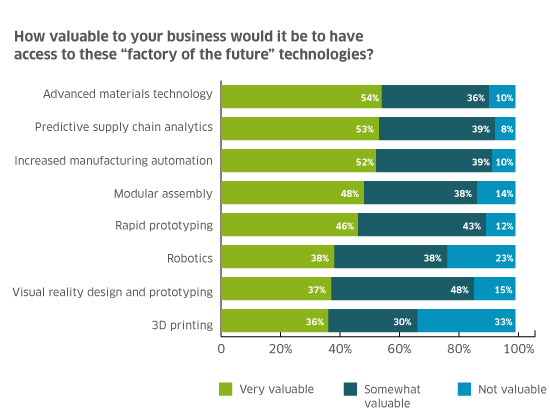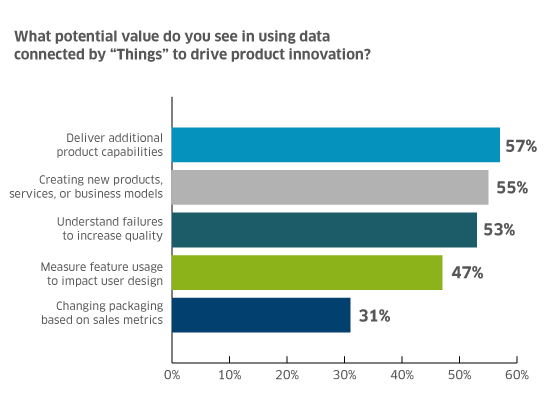Study: Digital Intelligence Driving Massive Business Transformation
The Internet of Things (IoT) is widely regarded as the next revolution in technology. Cisco predicts that by 2020, there will be 50 billion things connected to the Internet, generating revenues of $19 trillion. Cisco estimates that IoT will have 10 times the impact on society than the Internet has already had. Given some of the vertical data around key segments where IoT is already making an impact, this prediction is not hard to believe. For instance, industry watcher IDC predicts that the IoT market for remote health monitoring will grow from $8.2 billion in 2014 to over $12.4 billion in 2018, and Machina Research is projecting that by 2020, a remarkable 90 percent of cars will be connected.

Source: Jabil, 2015 Supply Chain Trends
Clearly, the impact of IoT is being felt in every industry, from healthcare to hospitality and everything in between. And while there is no argument that the benefits of the technology far outweigh the associated challenges, the compounding effect of the incremental speed of business, the need for an unprecedented IT backbone and cloud infrastructure and a unique talent set to run it all, has companies and business leaders scrambling. Not surprisingly, one of the most significant areas of impact is supply chain.
Increased demand for customization and robust acceleration of product development cycles are keeping supply chain leaders and their companies on their toes.
Think about it. The globalization of the industry is compounded by the proliferation of technology driven by increased competition, changing consumer demands and the “need it now” culture. The ripple effect on the supply chain is profound. There is an intense focus on driving time and cost out of the supply chain in order to solidify competitive positions and increase profitability. In addition, increased demand for customization and robust acceleration of product development cycles are keeping supply chain leaders and their companies on their toes. In other words, for the supply chain, IoT is both a blessing and a curse.

Source: Jabil, 2015 Supply Chain Trends
In April 2015, Jabil sponsored a Dimensional Research global survey of more than 300 supply chain professionals at companies that manufacture electronic goods. Our research anecdotally outlines several major trends and highlights how new technology innovation is unleashing massive disruptions in the marketplace, which, in turn, are driving the need for dramatic changes in the supply chain.
For example, while 75 percent of those surveyed report their companies are either planning to, in development or currently producing IoT-related products, 77 percent acknowledge they lack the in-house expertise needed to deliver them. Further, the study results clearly show that IoT is forcing manufacturers to acquire new skills. Everything from security and analytics, user experience and usability, device software and the cloud technology expertise required to store and connect information were identified as requirements for adopting IoT in meaningful ways.
To view the complete survey results please go to: http://www.jabil.com/blog/2015-Supply-Chain-Trends.html.
